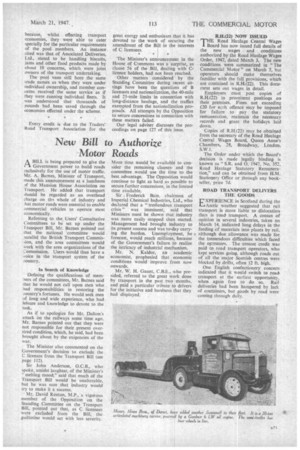Every credit is due to the Traders' Road Transport Association for the
Page 29

If you've noticed an error in this article please click here to report it so we can fix it.
New Bill to Authorize
Motor Roads ABILL is being prepared to give the Government power to build roads exclusively for the use of motor traffic. Mr. A. Barnes, Minister of Transport, made this announcement at a luncheon Jf. the Mansion House Association on Transport. He added that transport .;hould be regarded as an overhead charge on the whole of industry and hat motor roads were essential to enable commercial vehicles to operate most economically.
Referring to the Users' Consultative Committees to be set up under the Transport Bill, Mr. Barnes pointed out that the national 'committee would larallel the British Transport Commision, and the area committees would work with the area organizations of the Commission. Users would thus have a voice in the transport system of the country.
In Search of Knowledge Defining the qualifications of members of the committees, Mr. Barnes said that he would not call upon men who had responsibilities in restoring the country's fortunes. He would seek men of long and wide experience, who had leisure and knowledge to devote to the task.
As if to apologize for Mr. Dalton's attack im the railways some time ago, Mr. Barnes pointed out that they were not responsible for their present overtired condition, which, he said, had been brought about by the exigencies of the war.
The Minister also commented on the Government's decision to exclude the C licensee from the Transport Bill (see page 112).
Sir John Anderson, G.C.B., who spoke, amidst laughter, of the Minister's melting mood," said that much of the Transport Bill would be unalterable, but he was sure that industry would try to make it a success.
Mr. David Renton, M.P., a vigorous member of the Opposition on the Standing Committee on the Transport Bill, pointed out that, as C licensees were excluded from the Bill, the guillotine would act with less severity.
More time would be available to consider the remaining clauses, and the committee would use the time to the best advantage. The Opposition would continue to fight as hard as possible to secure further concessions, in the limited time available.
Sir Frederick Bain, chairman of Imperial Chemical Industries, Ltd., who declared that a " treniendous transport crisis" was imminent, said that Ministers must be shown that industry was more easily stopped than started. Management had brought industry to its present success and was to-day carrying the burden. Unemployment, he forecast, would reach millions, because of the Government's failure to realize the intricacy of industrial mechanism.
Mr. N. Kaldor, an academic economist, prophesied that economic conditions would improve from now onwards.
Mr. W. H. Gaunt, C.B.E., who presided, referred to the great work done by transport in the past two months, and paid a particular tribute to drivers for the initiative and hardness that they had displayed. R.H.(22) NOW ISSUED
rrHE Road Haulage Central Wages
Board has now issued full details of the new wages and conditions authorized by the Road Haulage Wages Order, 1947, dated March 3. The new conditions were summarized in "The Commercial Motor" on March 7, but operators should make themselves familiar with the full provisions, which are contained in R.H.(22). This document sets out wages in detail.
Employers must post copies of R.H.(22) in prominent positions on their premises. Fines not exceeding £20 for each offence may be imposed for failure to pay the statutory remuneration, maintain the necessary records and grant the holidays laid down.
Copies of R.H.(22) may be obtained from the secretary of the Road Haulage Central Wages Board, Queen Anne's Chambers, 28, Broadway, LOndon, S.W.I.
The Order under which the Board's decision is made legally binding is known as " S.R. and 0. 1947, No. 352, Road Haulage Statutory Remuneration," and can he obtained from H.M. Stationery Office or through any bookseller, price 7d.
ROAD TRANSPORT DELIVERS THE GOODS
EXPERIENCE in Scotland during the Arctic weather suggested that rail transport is more liable to dislocation than is road transport. A census of opinion in several industries, taken on March 14, indicated long delays in the feeding of materials into plants by rail.
• although due allowance was made for the tremendous difficulties which faced the operators. The utmost credit was paid to road transport operators, who kept services going. although roads out of all the major Scottish centres were blocked by drifts, often 12 ft. high.
One English confectionery concern indicated that it would switch to road transport at the earliest opportunity, when again free to do so. Rail deliveries had been hampered by lack of containers, but goods by road were coming through daily.












































































